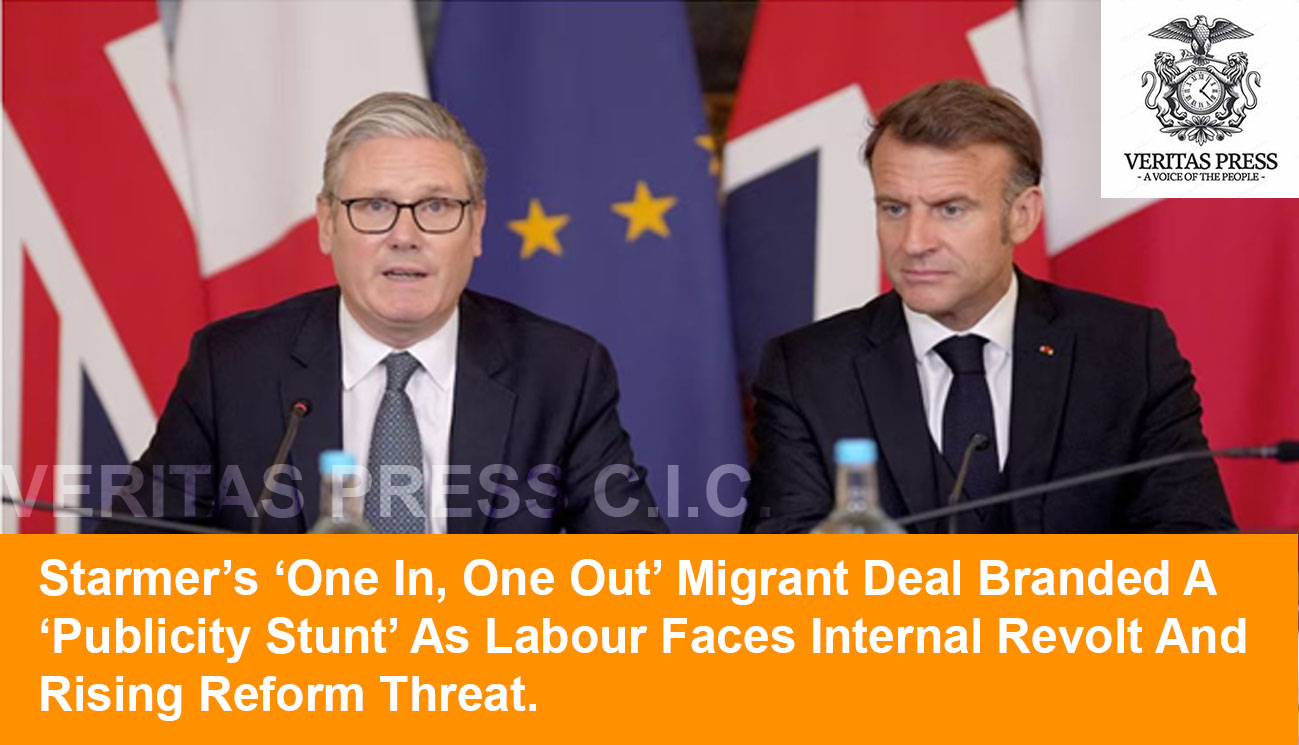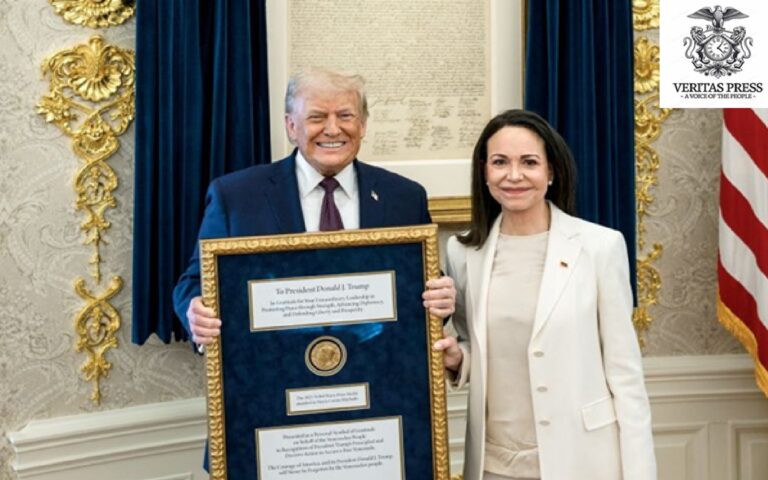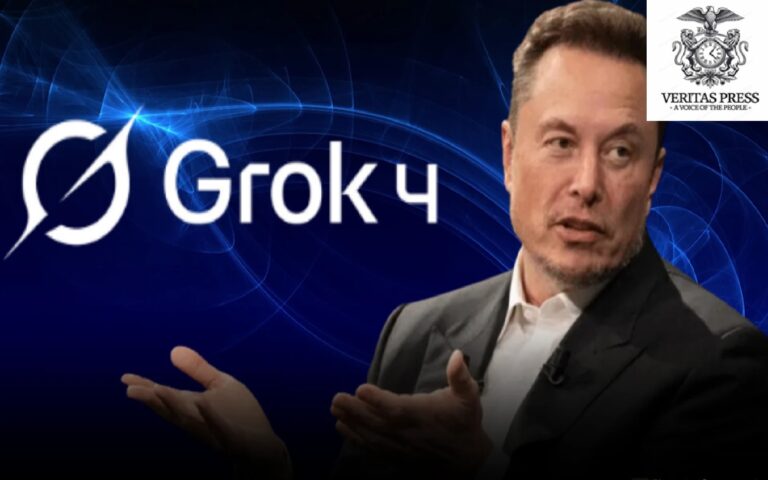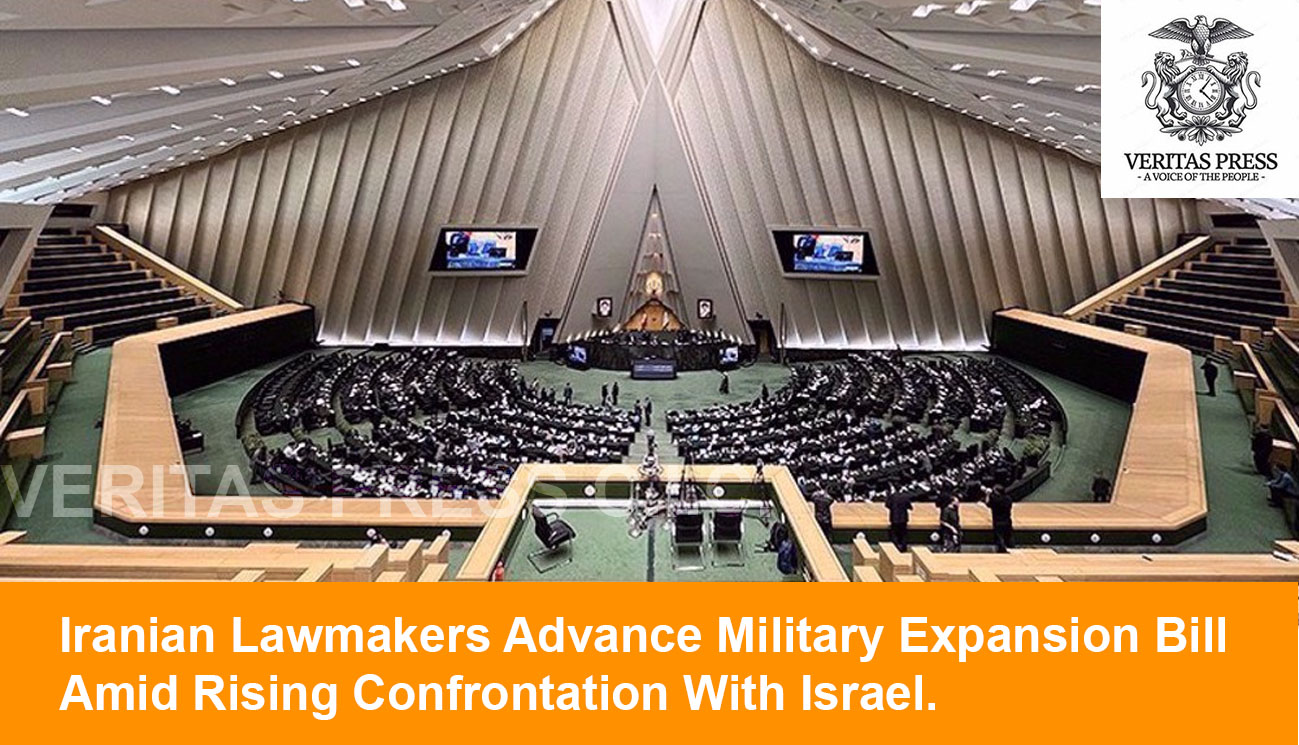Pollsters warn Macron’s agreement won’t reverse Labour’s slide amid growing distrust and backlash over migration crackdown.
Keir Starmer’s much-lauded migrant returns agreement with French President Emmanuel Macron is being dismissed by leading pollsters and critics as a shallow “publicity stunt” that will do little to address the Labour Party’s worsening political crisis.
The so-called “one in, one out” plan, under which the UK would return a limited number of Channel-crossing migrants to France in exchange for accepting asylum seekers with family or strong ties in Britain, has been unveiled as a centrepiece of the government’s immigration strategy. But experts warn it is too small in scale, too vague in detail, and too late to reverse the perception that the government has lost control of the borders.
According to Britain’s top polling experts, including Sir John Curtice, Lord Robert Hayward, and Luke Tryl, the policy is unlikely to shift public opinion or reclaim ground lost to Nigel Farage’s surging Reform UK party.
No Credibility, No Impact:
Speaking to The Independent, Professor Sir John Curtice, Britain’s most respected polling analyst, said:
“I would be surprised if it were to have a significant impact. The scale is limited, and it’s unlikely to shift the dial with voters who have already lost faith in Labour’s ability to manage migration.”
Lord Hayward, a Conservative peer and seasoned pollster, was more blunt:
“It’s a publicity stunt. There are so many unanswered questions, and frankly, it will have no real impact. The bigger issue here is confidence, and that’s at rock bottom.”
New polling reflects this crisis of trust. A recent Techne UK poll found only 23 per cent of voters are confident in the Labour government, while 63 per cent are not, resulting in a net confidence rating of -40. Meanwhile, Reform UK rose one point to 29 per cent, putting it a full seven points ahead of Labour on 22 per cent.
The optics of Thursday’s announcement were undermined within hours, as more than 700 people arrived in small boats across the Channel, a visual rebuke to any suggestion that the government has begun to regain control.
A Policy Built On Illusion:
Under the agreement with France, only around 50 people per week will reportedly be returned, a figure ministers have refused to confirm publicly. Yet the UK has already seen more than 21,000 Channel crossings so far this year, a 53 per cent increase from the same point in 2024.
Luke Tryl, director of the think tank More in Common, acknowledged that while the returns agreement might have symbolic value, the numbers don’t add up.
“This deal, in and of itself, won’t make much of an impact,” Tryl said. “But if people start seeing migrants actually being removed from the UK, then that could have a psychological effect. The problem is, right now, the crossings are evidence that the government has lost control.”
Tryl also highlighted that 74 per cent of voters view tackling small boat crossings as a higher priority than reducing overall migration. “Channel crossings define the immigration debate,” he said. “It’s one of the most visible failures.”
Labour’s Internal Divide:
The backlash is not just from outside. Starmer is also facing growing dissent from within Labour’s own ranks, particularly from the party’s left flank, over what many see as a harsh and performative turn against migrants.
A Survation poll of 1,304 Labour Party members for Labour-List, seen by The Independent, found 53 per cent oppose the plan to increase the citizenship qualification period from five years to ten for migrant workers. Only 36 per cent support it. The proposal is part of a broader clampdown on legal migration, which also includes ending overseas recruitment of care workers, a policy seen by many as both economically damaging and morally questionable.
One senior left-wing Labour figure told The Independent:
“Starmer is chasing Reform voters with policies that won’t satisfy them, and he’s alienating Labour members in the process. We’ve lost the moral compass on migration.”
Another left-leaning MP described the party base as “wounded” by recent announcements and questioned whether MPs would have “the stomach for a coup” if the polling continues to deteriorate.
The government has also quietly shelved previous Labour commitments to expand “safe and legal routes” for asylum seekers, further fuelling anger among progressives who argue that such pathways are key to reducing dangerous crossings.
“The focus on deterrence without legal alternatives is short-sighted,” one MP said. “We should be talking about giving people the right to work while claims are processed and creating humane systems, not mimicking Farage’s talking points.”
The Reform Reckoning:
Starmer’s pivot to tough-on-migration policies is widely seen as an attempt to stem the loss of support to Nigel Farage’s Reform UK, which has surged in polling on the back of the small boats crisis. But critics argue that Labour risks playing directly into Farage’s hands by allowing him to dominate the agenda.
Polling suggests that migration, especially Channel crossings, remains one of the most potent issues driving voter disillusionment. But the danger for Labour is that by attempting to outflank Reform on its own turf, it may only validate its core message: that neither main party has a credible plan, and that only a populist outsider can “take back control.”
As one veteran Labour strategist warned:
“You don’t beat Farage by becoming Farage-lite. You beat him by offering something principled, practical and different.”
A Lone Voice Of Support:
Not everyone in Labour is opposed to the Macron deal. Mike Tapp, the newly elected Labour MP for Dover and Deal, a constituency on the frontline of the Channel crossings, has backed the announcement and defended Starmer’s approach.
“Massive strides have been made in tackling the small boat crisis,” Tapp said. “This, combined with record deportations and tougher powers to dismantle criminal gangs, will make a difference. Reform? They’ll continue to fall apart.”
But even allies like Tapp face an uphill battle in convincing sceptical voters that the Macron agreement is more than a symbolic gesture.
Conclusion: A Crisis Of Trust, Not Just Policy.
The fundamental issue Labour faces is not merely one of immigration policy; it is one of political credibility. Keir Starmer’s leadership, once pitched as a stabilising antidote to Conservative chaos, is now increasingly defined by its own contradictions, U-turns, and a perceived ideological drift to the right. Rather than inspiring confidence, the party is struggling to convince the public that it possesses a coherent moral vision or governing strategy.
This crisis of credibility is particularly evident in Labour’s handling of migration. Instead of offering clarity and compassion, the party has resorted to reactive policymaking, pledging to crack down on illegal crossings, restrict legal migration, and extend the citizenship waiting period from five to ten years. Such positions have alienated progressive voters and party members alike, while doing little to win over those already drifting toward Nigel Farage’s Reform UK. As polling shows, these headline-grabbing pledges have not translated into renewed trust. At best, they signal political desperation; at worst, complicity in a race to the bottom.
But whether the figure is 50 returns a week or 500, the public mood is defined less by numbers than by narratives. And the dominant narrative under Starmer is one of drift, compromise, and retreat, on policy, on principles, and increasingly, on democratic norms. For a growing number of voters, Labour now looks like a party trying to be all things to all people, and succeeding at being nothing to anyone.
Crucially, Labour’s approach to immigration cannot be separated from its broader assault on dissent and freedom of speech. From its refusal to back an immediate ceasefire in Gaza to its treatment of pro-Palestine voices within the party, Starmer’s leadership has systematically sought to suppress internal dissent. Muslim, Black, and working-class communities who once saw Labour as a political home now feel increasingly marginalised and unheard. The crackdown on anti-war protests, the silence on draconian police powers, and the scapegoating of activists, especially young, racially minoritised ones, signal not only a deepening authoritarian instinct but a party leadership out of touch with its own base.
This repression of speech and grassroots mobilisation is having dire consequences. Rather than building trust in neglected communities, Labour is fuelling a sense of betrayal. Rather than broadening its coalition, it is narrowing the space for pluralism. The effect is a double alienation: those communities most vulnerable to punitive immigration policies are simultaneously being excluded from the political conversation that shapes them.
It is this dynamic of performative toughness paired with internal silencing that threatens to implode Labour’s electoral coalition. In its effort to appear “serious” and “electable,” the party risks becoming hollowed out: stripped of moral clarity, hemmed in by triangulation, and incapable of speaking with conviction. A party that cannot tolerate internal debate is ill-equipped to lead a divided country.
Unless Labour can articulate a migration and civil liberties policy that is both effective and principled, one that centres fairness, dignity, and social justice, it will continue to be outflanked by the very forces it hopes to contain. Farage and the hard right are not defeated by imitation; they are defeated by an alternative. And that alternative must include restoring freedom of expression, building trust with marginalised communities, and offering a vision of Britain that is humane, inclusive, and bold enough to resist scapegoating in all its forms.
Advertisements
Tags:
































